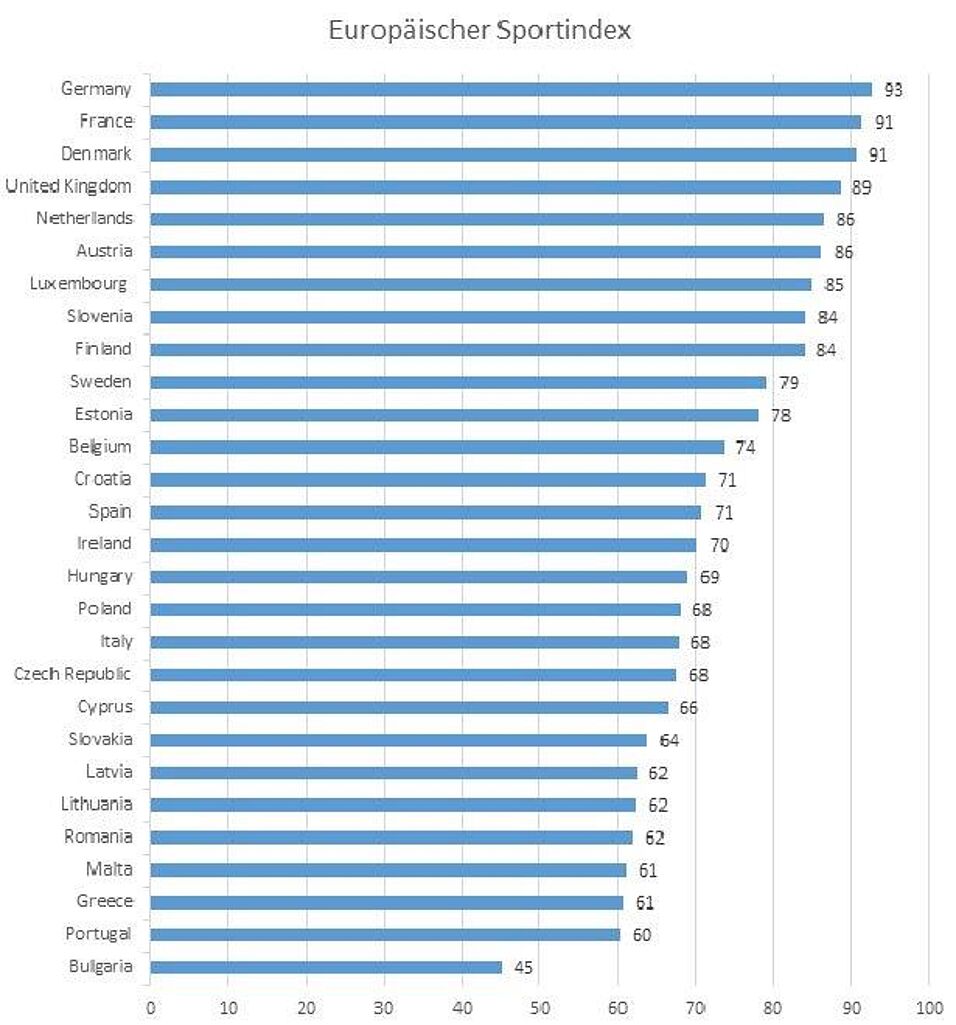Introduction
The significance of sport in modern societies is a recurring topic in debates, both by the general public and in the field of science. Contributions to these debates are, due to a lack of empiric evidence, usually limited to rough classifications concerning the social significance of sport (for example, a country might end uo bein referred to as a "ski nation" or a "football nation"). The study at hand attempts to provide such empirical evidence. It is based on a research project conducted at the Department of Sport Science of the University of Vienna, which had the main aim to operationalise the social significance of sport in the 28 member countries of the European Union through a depiction in certain measured parameters (indicators). The European Sport Index resulting from the use of said indicators enabled a ranking of the 28 EU countries by their social significance of sport.
Theoretical outline and methods
The determination of the social significance of sport is based on the increasingly important functions of sport in modern societies (integration, education, health, economy, politics etc.). Thus, the choice of indicators was grounded in the following functional areas: Active sport, that is, both recreational and professional sport, was one factor. Sport in its most important, institutionalised forms, namely sport clubs and schools, was another. Additionally, local sport opportunities and the political and economic importance of sport were included in the European Sport Index. To this end, a comprehensive desk research was performed as a first step. Following this research, a pragmatic approach was chosen. For the inclusion of an indicator into the European Sport Index – beside the mentioned functional areas – the availability, actuality, and comparability of the data of said indicator in the 28 EU countries were crucial. The following seven indicators conformed to these criteria and became part of the European Sport Index:
1. Sport participation refers to the frequency of active sport participation of the population of a country. This indicates the significance of recreational sport.
2. Sport club members indicates how many people in the population of a country are members of a sport club. This indicates the significance of club sport.
3. Amount of sport lessons at school states how many hours of physical education the 6 to 10-year-old students of compulsory schools in a country have to take part in. This indicates the significance of school sport.
4. Local sport opportunities describes the offerings and possibilities for sport participation available to individuals in their immediate living environment within a country. This indicates access to sport.
5. State aid represents the amount of monetary public funding for sport in relation to the gross domestic product (GDP) of a country. This indicates the socio-political significance of sport.
6. Gross value added through sport is the amount of revenue generated through sport as a part of the GDP of a country. This indicates the economic significance of sport.
7. Olympic success describes the sport performance of a country at the Olympic Games. This indicates the significance of professional sport.
Overall ranking – European Sport Index: The 28 EU member countries in comparison
Summing up the seven described indicators into the European Sport Index ranks the 28 EU member states as seen in Figure 1. The leading EU countries Germany and France display the highest Sport Index values. The “Motherland of Sport”, United Kingdom, places below Denmark on rank four. Malta, Greece, Portugal, and – significantly distant – Bulgaria form the lower end of the ranking.
Resume:
The European Sport Index provides, for the first time, an empirically determined measured value for the social significance of sport in the 28 EU member countries. It constitutes an additional measurement (alongside the European Quality of Life Survey, the PISA studies, the Human Development Index etc.) to describe the state of a society. The role of sport in certain segments of society is illustrated by the characteristics and values of individual indicators. These results are especially revealing when considered in the context of national and European sport politics in the particular areas.
Publication:
Weiß, O., Norden, G., Nader, M., & Arnusch, F. (2016). European Sport Index: the social significance of sport in 28 European countries. European Journal for Sport and Society, 13(2), 167-182. DOI: 10.1080/16138171.2016.1183933

